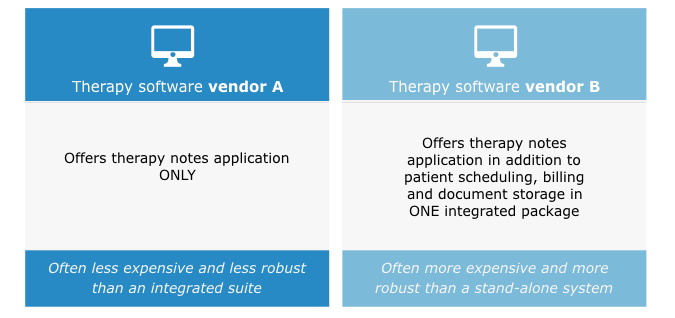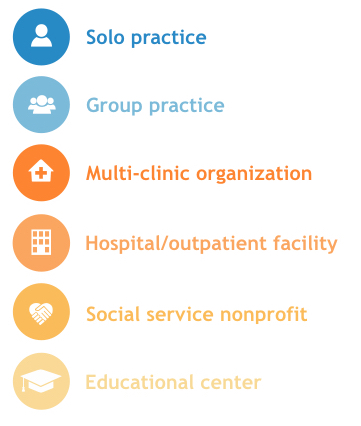Find the best Therapy Software
Compare Products
Showing 1 - 20 of 86 products
Sort by
Reviews: Sorts listings by the number of user reviews we have published, greatest to least.
Sponsored: Sorts listings by software vendors running active bidding campaigns, from the highest to lowest bid. Vendors who have paid for placement have a ‘Visit Website’ button, whereas unpaid vendors have a ‘Learn More’ button.
Avg Rating: Sorts listings by overall star rating based on user reviews, highest to lowest.
A to Z: Sorts listings by product name from A to Z.
TherapyNotes, LLC
TherapyNotes, LLC
TherapyNotes is a cloud-based mental/behavioral health software system that includes electronic health records (EHR), a patient portal, patient scheduling and medical billing. The solution is suitable for practices of all sizes, i...Read more about TherapyNotes, LLC
TheraNest
TheraNest
TheraNest is an HIPAA compliant web-based mental health solution used by solo practitioners, large mental health practices, and nonprofit organizations. The solution is suited for therapists, psychologists, psychiatrists, and soci...Read more about TheraNest
AdvancedMD for Mental Health
AdvancedMD for Mental Health
AdvancedMD is a unified suite of software designed for independent laboratories, medical, physical therapy and mental health practices. Features include practice management, electronic health records, patient engagement, telemedic...Read more about AdvancedMD for Mental Health
Valant EHR Suite
Valant EHR Suite
Valant’s Behavioral Health EHR and Practice Management Software includes all the tools you need to provide exceptional individual and group care while running a successful private practice. Unlike other non-specialized EMR softwa...Read more about Valant EHR Suite
Talk with us for a free
15-minute consultationSoftware Advice is free because vendors pay us when they receive sales opportunities.
This allows us to provide comprehensive software lists and an advisor service at no cost to you.
This allows us to provide comprehensive software lists and an advisor service at no cost to you.
Meet Eric, a software expert who has helped 1,534 companies select the right product for their needs.
Talk with us for a free
15-minute consultationSoftware Advice is free because vendors pay us when they receive sales opportunities.
This allows us to provide comprehensive software lists and an advisor service at no cost to you.
This allows us to provide comprehensive software lists and an advisor service at no cost to you.
Tell us more about your business and an advisor will reach out with a list of software recommendations customized for your specific needs.
STEP 1 OF 4
How many doctors are in your organization?
TotalMD
TotalMD
TotalMD is an extremely affordable, extremely intuitive Practice Management solution that offers small and growing practices the latest billing technologies and techniques at a fraction of the cost of their competitors. TotalMD pr...Read more about TotalMD
Luminello
Luminello
Luminello is a cloud-based electronic medical record (EMR) that helps psychiatrists, counselors and therapists in small mental health practices. It comes with a calendar scheduler, which allows users to manage appointment bookings...Read more about Luminello
EHR YOUR WAY
EHR YOUR WAY
DO NOT CLICK UNLESS YOU CAN PAY AT LEAST $800 A MONTH. ***NOTE: WE ONLY SERVE 15+ USER AGENCIES WITH A $800 MONTHLY MINIMUM IN LICENSE FEES. + 120-Day Money Back Guarantee + 5,000+ Features + Inpatient/Outpatient...Read more about EHR YOUR WAY
Opus EHR
Opus EHR
Opus Behavioral Health is a cloud-based electronic health record (EHR) platform for behavioral health and substance abuse teams at inpatient, outpatient and residential care facilities. Opus EHR is a certified solution that enable...Read more about Opus EHR
MedEZ
MedEZ
MedEZ is an electronic health record (EHR) and billing suite suitable for most medical facilities, particularly behavioral health centers and substance abuse rehabilitation programs. On-premise and cloud-based deployments are avai...Read more about MedEZ
ClinicTracker
ClinicTracker
ClinicTracker is a fully customizable EHR, billing and practice management software designed to automate your clinic workflows, boost your staff productivity and patient engagement, while shortening your billing cycle. We provide ...Read more about ClinicTracker
Kipu
Kipu
The Kipu Platform Kipu is the premier cloud-based solution for multi-provider and enterprise behavioral and addiction treatment centers. Our end-to-end platform includes a collaborative EMR system for management of health records,...Read more about Kipu
DrCloudEHR
DrCloudEHR
DrCloudEHR is suitable for midsize and large behavioral health, human services and integrated delivery systems. DrCloudEHR is meaningful-use (Stage-2) certified and 508 compliant, and it displays information as needed for intake...Read more about DrCloudEHR
CR Essentials
CR Essentials
CR Essentials (formerly Behaviorsoft) is an all-in-one secure clinical management solution that empowers small independent ABA providers to automate routine daily tasks for billing, client scheduling, human resource management, me...Read more about CR Essentials
MedicsCloud EHR
MedicsCloud EHR
Ideal for all levels of care, the MedicsCloud Suite operates as a singular solution from one vendor (ADS). Yet, the Suite's MedicsCloud EHR and its MedicsPremier financial/management segments are available separately as needed. ...Read more about MedicsCloud EHR
BIPTrack
BIPTrack
Designed to improve collaboration across mental/medical health professionals and administrators, teachers, and parents, BIPTrack is an online HIPAA-compliant behavior and skill tracking system that streamlines data collection, pro...Read more about BIPTrack
SimplePractice
SimplePractice
SimplePractice is a cloud-based practice management system built to make the business side of private practice easier. Our easy-to-use and HIPAA-compliant software helps health and wellness professionals automated their day-to-day...Read more about SimplePractice
CounSol.com
CounSol.com
VOTED BEST VALUE AWARD By Capterra!!! Top Choice for Practice Management! Personalized. Efficient. Complete. Online practice management exactly the way you want it. Offering live online chat & video sessions, custom questionnaire...Read more about CounSol.com
Mend
Mend
Launch your Behavioral Health Telemedicine program today. Mend is the #1 cloud-based CCBHC / CMHC communication solution that enables patients and providers to connect and share files, messages, assessments, photos and data. Use...Read more about Mend
DrChrono
DrChrono
DrChrono’s iPad and iPhone compatible EHR and medical billing platform allows medical practices and healthcare providers to manage patient intake, patient care, clinical charting, billing and revenue cycle management. It includes ...Read more about DrChrono
NueMD
NueMD
NueMD offers a suite of cloud-based software and medical billing services for practices of all sizes. NueMD is an integrated practice management, medical billing, electronic health recording and appointment scheduling solution. ...Read more about NueMD
Buyers Guide
Last Updated: March 16, 2023If you’re among the thousands of therapy practices that want to go paperless or replace clinical software, you’ve come to the right place. It can be daunting to sort through the many electronic health record (EHR) systems out there for mental and behavioral health care providers. What’s more, pricing and functionality varies greatly from system to system.
This guide will help you better understand the therapy software market. Using it, you can narrow down your list of potential products for an upcoming purchase.
We’ll discuss the following:
Common Functionality of Therapy Software
What Is Therapy Software?
The term “therapy software” applies to any software that helps therapists deliver better care, manage their practice or process their billing. These systems offer a range of tools that facilitate everything from clinical documentation to scheduling and insurance claims submission.
Therapy software vendors may sell a single application, such as therapy notes, as a stand-alone solution. Alternatively, they may offer a number of applications bundled together to form an integrated EHR suite for therapists.

The breadth and depth of applications in the system you choose will depend on your needs, user base and budget. This is especially true in therapy practices, which come in all manner of sizes and specialties employing social workers, therapists, counselors, psychiatrists and/or psychologists:

If you’re a smaller therapy provider and/or outsource your medical billing, it might be more cost-effective to seek stand-alone applications to fill specific gaps in health information technology. For example, if your only goal with a new system is to digitize your staff’s clinical notes, buying a stand-alone clinical documentation system makes more sense than a full EHR. Otherwise, you may end up paying for functions you don’t need, such as e-prescribing or patient portals.
Since larger therapy providers tend to have a larger number of users and require a greater level of care coordination, integrated therapy EHR suites are often the more practical choice. With several different functions packaged together, it’s easier to extract meaningful health outcomes data while tracking clinical and budgetary goals.
Common Functionality of Therapy Software
As we explained above, the tools provided in therapist software products may vary. Here are some of the most common ones, which may be sold as stand-alone applications or as part of integrated suites:
Clinical documentation | Therapists can create, store and review a number of digital clinical documents for each patient’s records. These include intake notes, progress notes, treatment plans, medical histories and more. |
Electronic claim filing | Users can file claims electronically through the system, then track progress to see which claims have been submitted, accepted and approved. |
Appointment scheduling | Allows users to schedule single or recurring appointments in a digital calendar. Some systems let you track cancellations and no-shows or send automated therapy appointment reminders to your patients through email, text or phone. |
Billing | Most solutions allow for a number of different billing functions. These include generating patient invoices, statements and superbills. The software can also produce single or batch CMS-1500s and/or billing reports. |
Coding | When filling out clinical documentation, most systems allow users to select the appropriate DSM-5 and/or ICD-10 codes from a pre-populated menu for faster, more accurate coding. |
Market Trends to Understand
Once you’ve identified your organization’s must-have software functions and are ready to start considering specific vendors, it’s important to consider these market trends:
HIPAA compliance. The government’s privacy and security laws—the Health Insurance Portability and Accountability Act (HIPAA) and the Health Information Technology for Economic and Clinical Health (HITECH) Act—help safeguard patient data, and they carry steep penalties if violated. Reputable vendors will make sure you understand how and why their products can help you achieve HIPAA compliance by explaining data protection and encryption capabilities.
Cloud-based systems. One of the first choices you’ll have to make when selecting new software is whether to pick a cloud-based or an on-premise system.
Cloud-based systems are becoming increasingly common in the therapy software market, as they bring a number of benefits:
Remote accessibility
Lower upfront costs
Software updates handled by vendor
System maintenance handled by vendor
It’s important to note, however, that therapy practices in rural settings may have a hard time accessing the broadband Internet that’s required to run a Web-based system.







